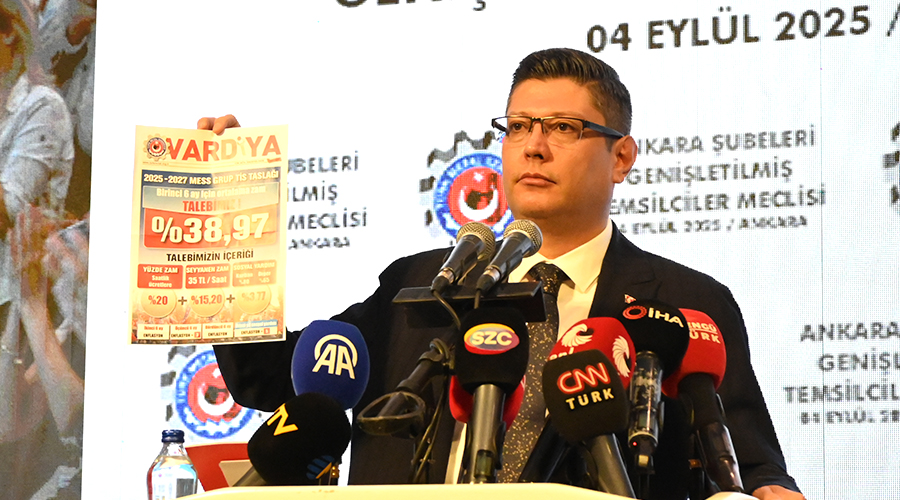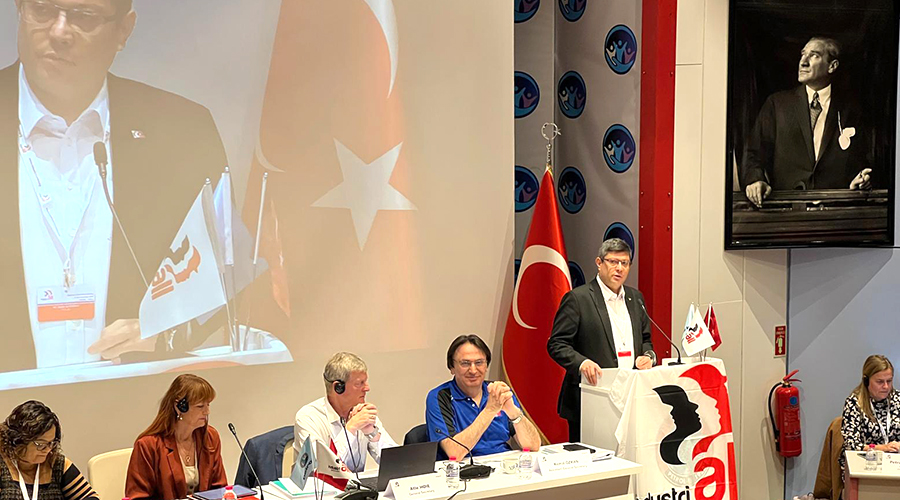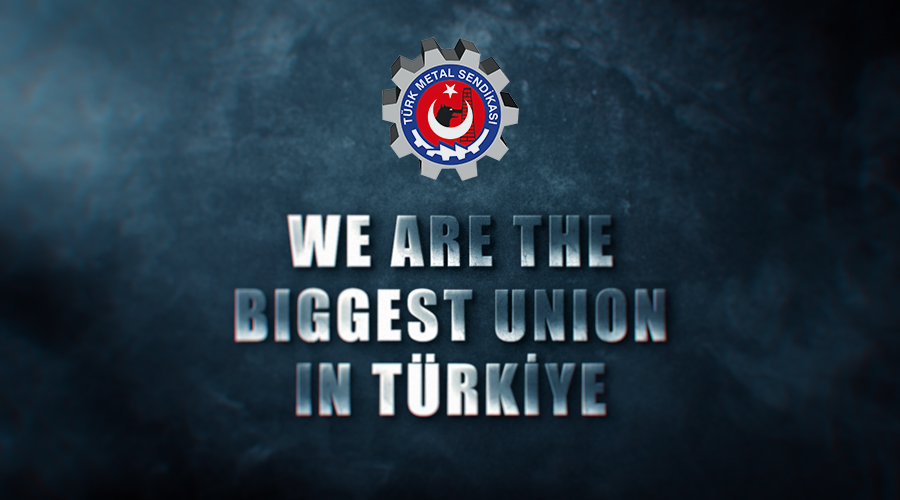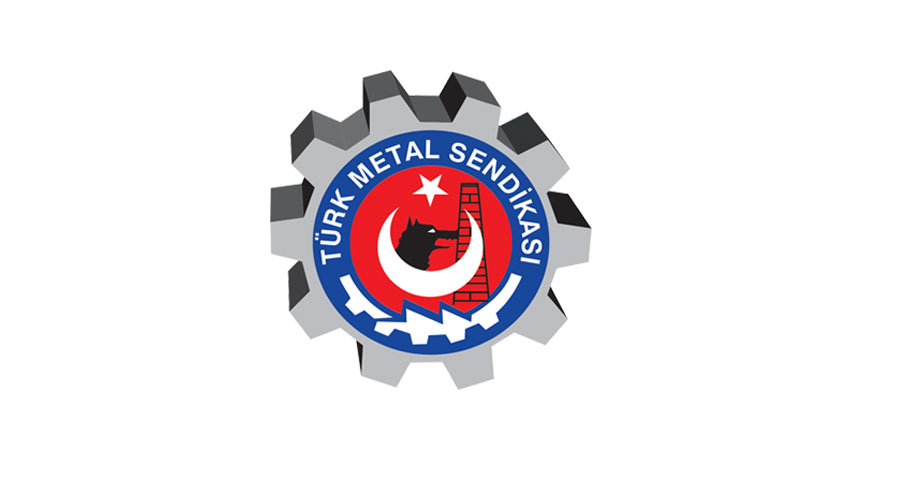5th EUROPE-MEDITERRANEAN METAL INDUSTRY UNIONS PERMANENT CONFERENCE
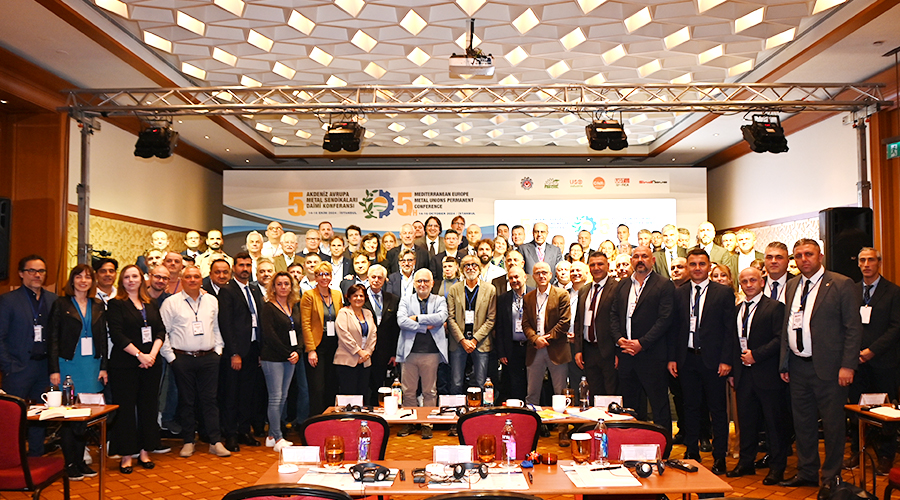
The fifth Standing Conference of Mediterranean-European Metal Unions, which aims to develop and strengthen cooperation and solidarity among metal sector unions in the Mediterranean-European region, was held in Istanbul on 14-16 October. The conference, which convened under the title ‘Skills Challenges’, was attended by 109 trade union representatives from 13 countries.
The conference started on Monday, 14 October with a briefing on the agenda and content of the meeting by Yücel Top, Coordinator of the Standing Conference of Mediterranean-European Metal Unions, and Claudio Arlati, President of the Italian Trade Union Development Association Sindnova.
***
Our General President Uysal Altundağ made the first speech in the opening session of the conference. Our General President Uysal Altundağ, who stated that they came together to produce common solutions to the common problems of metal workers, who have an important place among the European working class, said: ‘We come from different union cultures and understandings, but the conditions we are in are almost the same. We have common problems. In all the meetings we have held so far, we have discussed the problems and issues that are closely related to all of us, and we have exchanged views. In this meeting, we will touch upon various issues that are very closely related to the working class. Because as you all know, we are going through a period of significant changes and transformations in industrial relations. Many concepts such as Industry 4.0, digitalisation, decent work, social solidarity economy are entering the industrial relations system. Concepts such as ‘Green economy’ and ‘Green jobs’, which have been brought to the agenda in order to keep our world, which has been worn out by neoliberal policies, as a habitable place and to make our world a better place for humanity, are intensively discussed. Labourers working with a fair wage, having social security in case of health, unemployment and disability, providing equal opportunities for women and men and many other issues have an important place on the agenda of the world. In this meeting, we will talk and discuss digital transformations, green economy, and the new structuring that artificial intelligence will bring to industrial relations. We will share the accumulated knowledge on this subject with each other. We will discuss the role and duty of trade unions and what needs to be done.’
Continuing his speech by mentioning the approach of young employees to trade unions, our General President explained his views on the subject as follows ‘Another issue we will focus on is the situation of young union members regarding union processes and what we will do to adapt them to the new industrial relations system. I would like to point out that the issue of young workers is a very important issue that our unions should emphasise and work on in the coming period. Because the perception of trade unions and union loyalty among young workers are weakening day by day, and the interest of young people in trade unions is decreasing. From time to time, I hear complaints about this issue from my European trade unionist friends with whom I have conversations. In that case, our duty is to introduce young workers to the trade union more closely, to explain to them the importance of the trade union and the trade union struggle. In particular, to make them realise that it is difficult to gain rights and win without union struggle. We must explain to them not only the importance of trade unions, but also the importance and necessity of international working class solidarity. Because we all know that what we can do at the level of individual unions or even countries in the face of this great global economy is limited. Our struggle alone will not always lead to results. It is not enough to struggle alone against attacks on trade unions, low wage policies, the elimination of our social rights, and the end of injustice. In order to explain these issues and to involve our young members more effectively in the trade union struggle, we launched a new project last March. We organised the Turkish Metal Union Young Workers' Grand Congress. We were together with our young members there, we discussed our problems and looked for solutions together. From now on, we will organise this congress every year on 19 May, the day that Mustafa Kemal Atatürk, the founder of our Republic, entrusted to the youth, and we will strive to develop the union consciousness of our young members.’
Our General President Uysal Altundağ continued his speech by mentioning the problem of unionisation of workers working in supply chains, ‘As you know, our country is an important country where large companies from many countries of the world, but especially from Europe, invest. The reason for this situation is, of course, that our country is seen as a cheap labour paradise for global capital. As a union, we continue our struggle against this. We organise in these workplaces and sign very successful collective agreements in order for our members to live a life worthy of human dignity. However, in unorganised workplaces, workers struggle to survive with minimum wages and without any social rights. On the other hand, we attach great importance to union organisation and struggle to bring unorganised workplaces under collective agreements. However, I regret to state that European companies, which attach great importance to trade union rights and freedoms in their own countries, do not respect the trade union rights of employees when they invest in our country. Many of our European trade unionist friends, with whom we work under the roof of IndustriALL, know this situation closely. We carry out these organisations with their support from time to time. However, I know that today there are important developments in global supply chains that redefine the limits of responsibility of companies in the face of environmental risks and human rights violations. In particular, the German Supply Chain Act, which entered into force on 1 January 2023, and the European Union Due Diligence Directive, which entered into force on 25 July 2024, radically transform the obligations of companies in these areas. From now on, companies will not only be held liable for human rights violations in the context of their own internal activities, but also for human rights violations in the context of the activities of ‘direct’ and ‘indirect’ stakeholders in their global supply chains and, of course, for violations of trade union rights. We attach great importance to these regulations in terms of preventing the behaviour of global companies that do not respect trade union rights against trade union rights and freedoms.’
***
In the opening session of the Conference, Ferdinando Uliano, General Secretary of the Italian Metalworkers' Union FIM CISL, spoke after our General President Altundağ and said: “This Conference is strategically very important both to improve and protect workers” rights and to strengthen the international solidarity of trade unions. Unfortunately, the Mediterranean region has been witnessing wars and conflicts recently. In such an environment, protecting and improving workers' rights is the main agenda of this Conference.’
***
Taking the floor after Uliano's speech, Yasser Hassan, Director of the ILO Turkey Office, quoted ILO Director General Gilbert F. Houngbo's speech and said the following ‘In his speech at the International Labour Conference, ILO Director General Gilbert F. Houngbo said: ‘We are in a period of crises. Structural inequalities are worsening for millions of people. Uncertainty arises in these times of crisis. Employers are unable to realise their investments and workers are working in precarious conditions'. It is in such a climate that we are organising the fifth Permanent Conference of the Mediterranean European Metal Unions. Today's transformations are taking place simultaneously. These transformations also affect supply chain markets. These transformations create opportunities in the labour market, but also lead to negative consequences such as the spread of informality and precarious working practices and the weakening of trade union rights. It is important for us to ensure the continuity of investments, realise cost efficiency, and reduce raw material and logistics costs.’
***
Following the opening session, the conference will be organised as ‘Digital Transformations, Green and Artificial Intelligence: What are the Challenges Facing the Mediterranean-European Industry? ’, the first panel discussion was organised. The opening speech was delivered by Prof. Marco Ricceri, Eurispes expert at the Italian Institute for Political, Economic and Social Research, and the panel was moderated by Claudio Arlati, President of Sindnova, the Italian Trade Union Development Association. The speakers of the panel were Natale Forlani, President of the Italian National Institute for Public Policy Analysis INAPP, Giorgio Graziani, Confederal Secretary of the Italian CISL, Kemal Özkan, Deputy Secretary General of IndustriALL Global Union, Elisabetta Gualmini, Member of the European Parliament and Ümmühan Bardak, Representative of the European Training Foundation (ETF). The first day of the conference was concluded with the evaluation of the results of the first day by Barbara Arsieni, Head of the International Relations Department of the Italian Metal Union FIM CISL.
The opening speech of the first panel of the second day of the conference was made by Helmut Lense, International Consultant of Türk Metal Union. The panel on ‘Skills Challenge in the Automotive Sector’ was moderated by Italian Journalist Rita Querze and the speakers were Pedro Ayllon, General Secretary of the Spanish USO Industrial Union, Judith Kirton-Darling, General Secretary of IndustriAll Europe, Ferdinando Uliano, General Secretary of the Italian Metal Union FIM CISL, Ergin Dinç, President of the Turkish Metal Union Research and Training Centre (TAEM) and Christian Steffen from IG Metall Union Baden Württemberg, Germany.
***
The second day of the second day was entitled ‘The Challenge of Skills in the Automotive Sector, Employers’ Perspective’
The second panel was moderated by Journalist Hacer Boyacıoğlu. Tolga Görgülü, Human Resources Director of Oyak Renault, Orçun Sarıca, Human Resources Director of TOFAŞ, Yiğit Özgünel, Human Resources Manager of Mercedes-Benz Türk and Juan Domingo, Production Engineering Director of Nissan from Spain took the floor in the panel.
***
The last panel of the day, which was held after lunch, was titled ‘Skills Problems of Young Trade Union Members and Demographic Transition’ and the opening speech of the panel was made by Prof. Alessandro Rosina from the Catholic University of Milan. The panel was moderated by Margherita Roiatti, Deputy Director and Coordinator of International Relations of ADAPT, and the speakers were Alessio Pastore, Youth Representative of FIM CISL Lombardy, Italy; Suay Işık Peköz, Researcher at Türk Metal Union Research and Training Centre; and Marko Minic, Trade Union President of Wacker Neuson Plant in Serbia. The second day of the conference was completed with the evaluation of the results of the second day by Yücel Top, Coordinator of the Standing Conference of Mediterranean-European Metal Unions.
***
The opening speech of the fifth and final panel on the third day of the conference was delivered by Ahmed Kamel, IndustriALL Global Middle East and North Africa Mena Region Secretary. The panel titled ‘The Difficulty of Unionisation of Workers in Supply Chains: The Case of Automotive Sector’ was moderated by our General Secretary Taliphan Kıymaz, while the speakers of the panel were Gianluca Ficco, National Secretary of Italian UILM UIL Union, Erencan Martı, Expert of Turkish Metal Union, Igor Gjerasov, President of SIER Metal Union of North Macedonia and Benoit Ostertag from the Economics Department Responsible for Automotive Sector of French FGMM CFDT Union. Barbara Arsieni, Head of the International Relations Department of FIM CISL, read the final declaration prepared after the panels. In the declaration, it was decided to organise the next meeting in Morocco. The conference was concluded with a speech of thanks by Yücel Top, Coordinator of the Standing Conference of Mediterranean European Metal Unions.
TOWARDS AN INCLUSIVE HUMAN-CENTRED APPROACH FOR NEW CHALLENGES IN THE WORLD OF WORK
5th MEDITERRANEAN EUROPE METAL UNIONS PERMANENT CONFERENCE FINAL DECLARATION
We, the trade unions Türk Metal Sendikası, Fim Cisl, FGMM CFDT, FICA UGT, USO Industria and SindNova, organisers of the 5th MEDITERRANEAN EUROPE METAL UNIONS PERMANENT CONFERENCE, gathered in Istanbul from 14 to 16 October 2024, to reaffirm the need for a people-centred approach to seize the opportunities and face the risks of the world of work.
Together with the trade unions attending the conference, from 13 different countries, and 15 institutions, we strongly demand that the transitions that are impacting the world of work be managed through social dialogue and that they be used to raise the quality of work for all.
We are confident that technologies based on safe and trustworthy artificial intelligence can increase productivity, improve working conditions, empower workers and create new opportunities for quality work, but we stress that the benefits of artificial intelligence in the world of work can only be maximised when rights and social inclusion are at the forefront, empowering workers and their representatives, with particular attention to the most vulnerable. We stress that social dialogue and collective bargaining can help ensure the safe and reliable adoption of artificial intelligence in the world of work.
The adoption of AI in the world of work is changing skills needs, as it reshapes the composition of workers' tasks and skills. We call for learning systems to adapt rapidly to these transformations, ensuring access to continuous, flexible and good quality training for ALL workers, especially the low-skilled, women and the young workers, and those in small and medium-sized enterprises.
It is time to make the ecological and environmental transition of the main automotive, metalworking and electromechanical sectors socially sustainable through the development of a coherent industrial policy, a dedicated European fund, cohesion policies and national accompanying and intervention programmes.
The production situation in the automotive sector is dramatic in several countries.
All trade unions present at the conference express their solidarity with the Italian workers in the sector, who will demonstrate on 18 October in Rome to awaken and call the European and national institutions to their responsibilities.
An ageing population is rapidly becoming one of the factors driving labour shortages in key economic sectors, such as engineering, in many European countries.
It is necessary, in line with Agenda 2030, to ensure the migration of skilled workers through safe and controlled arrivals.
An ageing population is also changing the demand for skills and there is a need to develop lifelong learning systems through social dialogue, facilitating access to high quality job opportunities for all, improving worker engagement and helping to address labour shortages. In a Europe affected by demographic ageing, adequate policies to support parenthood and the management of migration flows are crucial for growth and welfare.
We strongly support initiatives to restore peace and promote reconstruction and recovery in all areas of conflict and crisis, with the aim of promoting fundamental principles and rights at work and the application of international standards, including through social dialogue.
Convinced that the Mediterranean is the strategic heart of the planet in the geopolitical, economic and social future of Europe, we have decided to develop this initiative of ours by constituting a Restricted Committee chaired by a member for Fim Cisl, SindNova, Türk Metal, which during the period between each Conference, will interface with IndustriALL Global Union, in particular from the MENA region and Industriall Europe, in order to build a path of exchanges, researches and studies, data, contractual experiences and existing wage and regulatory treatments, so that there can be a mutual growth, keeping us constantly updated on the major contractual results, creating a network of exchange that will increase the level of interaction between the organising countries and all the countries that refer to the MENA Region.
In addition to this committee, the conference decided to set up four sectoral working groups on automotive, household appliances, electronics and steel, which will tend to meet quarterly by videoconference, in order to exchange information and best practices on trade union activity carried out in the sectors. The composition of the working groups will substantially follow that of the select committee.
The partnership is committed to identifying possible joint projects on topics of common interest, to be implemented with the support of SindNova.
The organizing unions consider Morocco as a potential venue to host the Sixth Permanent Conference of Mediterranean Metalworkers' Unions considering the numerous industrial and social challenges in this area.




